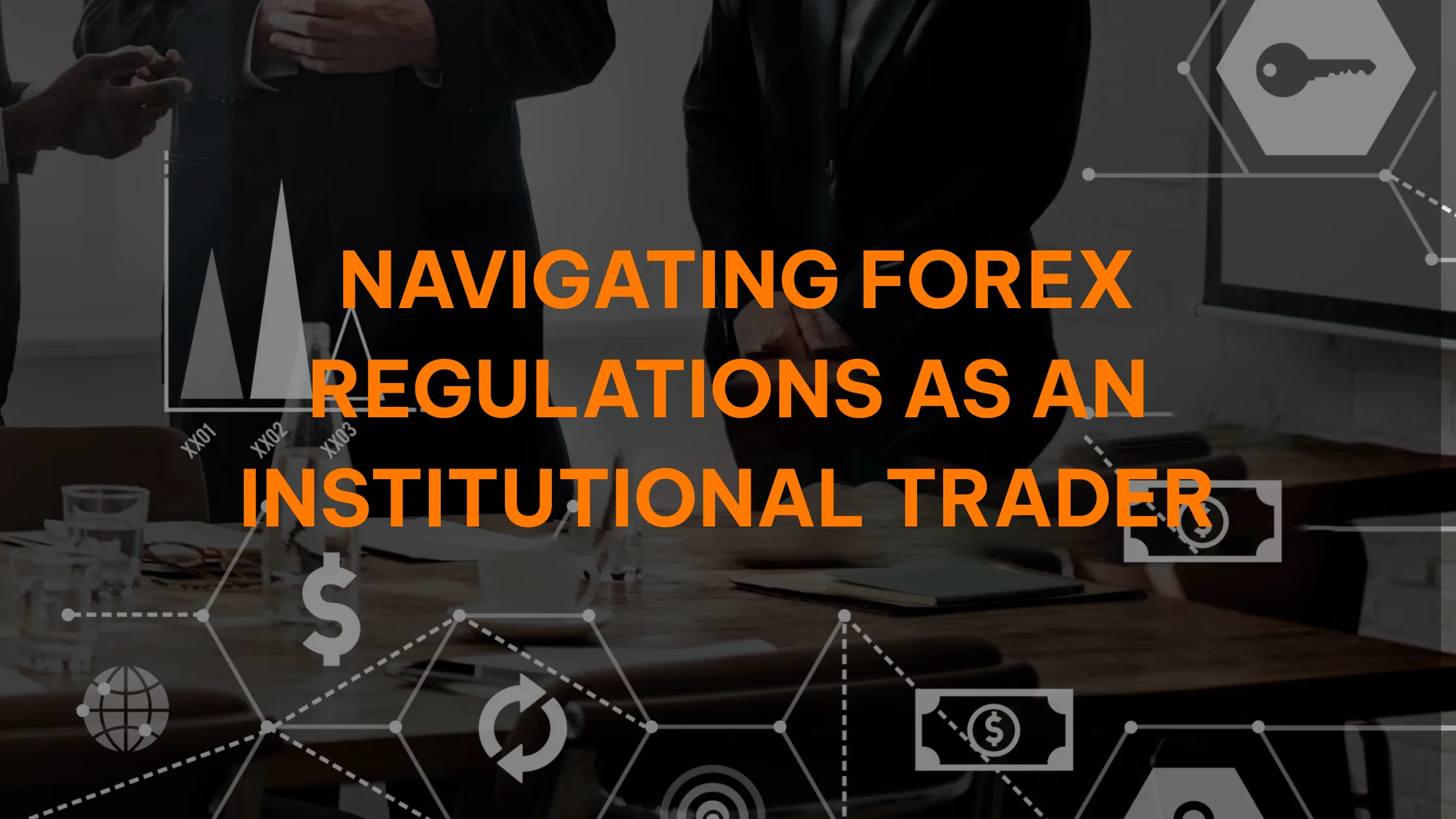
The global forex market is one of the most lucrative yet highly regulated financial landscapes. For institutional traders, understanding and adhering to forex regulations is not just a best practice but a necessity. Compliance with the evolving regulatory frameworks ensures market stability, fosters trust, and prevents potential legal and operational pitfalls.
This post will explore the core regulatory requirements institutional forex traders must navigate, the risks of non-compliance, and best practices for maintaining adherence to global standards.
Understanding Forex Regulations
Forex regulations are established guidelines set by financial authorities to govern market operations and protect participants. They play a crucial role in ensuring fair trading practices and safeguarding the integrity of the market.
Regulatory Bodies Overview
- FCA (Financial Conduct Authority, UK): Oversees forex activities, ensuring fair competition and consumer protection.
- CFTC (Commodity Futures Trading Commission, USA): Regulates forex trading under strict conditions to avoid fraud and malpractices.
- ASIC (Australian Securities and Investments Commission): Monitors forex brokers and traders to maintain a transparent market.
- ESMA (European Securities and Markets Authority): Enforces EU-wide policies affecting institutional trading, including leverage caps and transparency rules.
Each of these bodies sets unique standards that shape how institutional trading operates in different regions.
Differences in Regulations Across Regions
While there are commonalities, regulatory nuances exist between regions. For example, European regulations under ESMA may impose stricter leverage limits compared to the more flexible standards seen in certain APAC countries. Institutional traders need to be aware of these variances to effectively manage cross-border compliance.

Key Regulatory Requirements for Institutional Forex Trading
Institutional traders must navigate a wide array of regulatory mandates to ensure smooth operations. Below are essential areas of compliance:
Licensing and Registration
To operate legally, institutions must obtain the appropriate licenses and register with relevant regulatory bodies. This process varies based on jurisdiction but generally includes meeting specific financial and operational criteria.
Capital Requirements
Many regulatory frameworks impose minimum capital requirements to ensure that institutional traders can manage potential losses without jeopardizing the market’s stability. For example, the FCA mandates sufficient capital reserves to provide a cushion against market volatility.
Leverage Restrictions
Leverage enables traders to control larger positions with smaller capital. However, excessive leverage can lead to significant losses. Regulations often cap leverage to protect institutions from unsustainable risk levels. For example, in the EU, leverage for major currency pairs is restricted to 30:1 for retail clients, but institutions may access higher levels subject to proving their sophistication and risk management capabilities.
Reporting and Transparency
Institutional forex traders are often required to comply with strict reporting and transparency guidelines. Regulators like the CFTC and ESMA mandate periodic financial reporting and transaction disclosures. These measures ensure that trades are conducted fairly and that market manipulation is prevented. Compliance includes maintaining detailed transaction records and submitting periodic reports to the relevant authorities.
Risks of Non-Compliance
Failure to adhere to forex regulations can have severe consequences for institutional traders. Understanding these risks is crucial to maintaining operations without disruption.
Legal Repercussions
Non-compliance can lead to significant fines, legal battles, and potentially losing trading licenses. High-profile cases show that regulatory bodies do not hesitate to take action against violators. Institutions found guilty may face multi-million-dollar fines and bans that damage their ability to operate in the market.
Reputation Damage
Beyond financial penalties, regulatory infractions can erode trust among clients, partners, and investors. Reputation damage can impact long-term profitability and the ability to attract and retain institutional clients. Maintaining compliance helps safeguard the credibility of trading entities and fosters trust in business relationships.
Operational Disruptions
Regulatory violations can disrupt operations, leading to suspended activities or limitations imposed by authorities. These disruptions not only affect current trading activities but can also delay strategic moves, such as entering new markets or launching new products.
Best Practices for Compliance in Institutional Forex Trading
To successfully navigate the complex regulatory landscape, institutional traders should adopt robust practices that align with global standards. Here are some strategies to ensure compliance:
Developing a Robust Compliance Framework
A comprehensive compliance framework should be tailored to the institution’s scale and region of operation. Essential components include policy creation, regulatory risk assessment, and an internal audit system. Establishing a dedicated compliance team can help manage regulatory adherence effectively.
Continuous Training and Education
Regulatory landscapes are ever-evolving, making continuous training crucial. Institutions should ensure that their trading teams and compliance officers remain informed about new laws, amendments, and best practices. Regular workshops, webinars, and certification programs can provide the necessary updates and skills.
Utilizing Technology for Compliance
Modern technology plays a pivotal role in enhancing compliance efforts. Automated tools can streamline monitoring, reporting, and data analysis, reducing human errors and ensuring real-time compliance. For example, AI-driven platforms can alert compliance teams about potential breaches or new regulatory updates, helping institutions remain proactive.
Partnering with Legal and Compliance Experts
Engaging external legal and compliance professionals ensures that institutions have the support needed to interpret complex regulations. These experts can offer tailored advice, handle cross-border compliance issues, and provide insights into best practices that align with regional standards.
Navigating Specific Regulatory Challenges
Institutional forex traders often face unique regulatory challenges that require specialized strategies for compliance. Key challenges include:
AML (Anti-Money Laundering) and KYC (Know Your Customer)
AML and KYC protocols are vital for preventing financial crimes. Compliance requires thorough vetting of institutional clients to confirm their legitimacy. This process includes verifying identities, understanding the source of funds, and monitoring transactions for suspicious activities. Failure to comply can lead to hefty fines and reputational damage.
Handling Cross-Border Trading Regulations
When trading across multiple jurisdictions, institutions must navigate a complex web of regional rules. Each country may have its own compliance requirements, making it essential to maintain a robust system that tracks and adapts to these differences. Leveraging local regulatory expertise and automated compliance tools can help streamline cross-border trading operations.
Adapting to Changing Regulations
Regulatory changes are inevitable, as governments and financial authorities continuously refine policies to address emerging risks. Staying ahead requires a dynamic compliance strategy capable of adapting quickly to new rules. Institutions should have a system in place to monitor updates from key regulatory bodies and adjust internal policies as needed.
Case Studies and Examples

For instance, in 2020, a well-known trading firm faced severe fines for violating CFTC regulations related to reporting and transparency. This case highlighted the importance of thorough record-keeping and transparent disclosures, illustrating that even large institutions must remain vigilant to avoid penalties.

On the other hand, some institutions have thrived by prioritizing compliance. One example is a European trading firm that proactively adopted ESMA’s new leverage restrictions before they were officially mandated. This early adoption not only kept them ahead of competitors but also enhanced their reputation as a reliable and compliant institution.
Common Missteps and How to Avoid Them
Institutional traders should be aware of common mistakes that can compromise compliance:
Overlooking Regional Nuances
Assuming that a single compliance strategy can work globally is a major pitfall. Instead, traders should develop region-specific approaches that address local regulations.
Inadequate Documentation
Insufficient record-keeping can lead to severe compliance issues. Institutions should ensure meticulous documentation of all trading activities, reports, and client interactions. Digital record-keeping tools can simplify this process and make auditing more efficient.
Failing to Update Policies Regularly
Regulatory environments shift frequently, and policies that remain static become obsolete quickly. Instituting a process for routine policy reviews and updates helps maintain compliance with minimal disruptions.
The Future of Forex Regulations
Trends in Global Regulations
As forex markets evolve, so do their regulations. Institutions should prepare for tighter restrictions on leverage, increased transparency mandates, and enhanced consumer protection measures. Regulatory bodies are also exploring rules that address the influence of high-frequency trading on market stability.
Impact of Technological Advancements
Blockchain, fintech innovations, and AI are reshaping the compliance landscape. Technologies like blockchain can offer secure and immutable records, simplifying auditing and compliance. AI-driven tools will likely become more integral to risk management and real-time regulatory monitoring.
Sustainability and Ethics
The focus on ESG compliance is expected to grow, with regulations potentially incorporating more ethical trading standards. Institutions will need to balance profit with responsible trading practices that align with environmental and social governance principles.
Understanding and adhering to forex regulations is essential for institutional traders aiming for long-term success. By staying informed and proactive, traders can not only avoid the pitfalls of non-compliance but also leverage regulatory adherence as a competitive advantage.
Join Our Regulatory Compliance Webinar to gain deeper insights into how your institution can stay ahead in navigating complex forex regulations and optimize compliance strategies.

